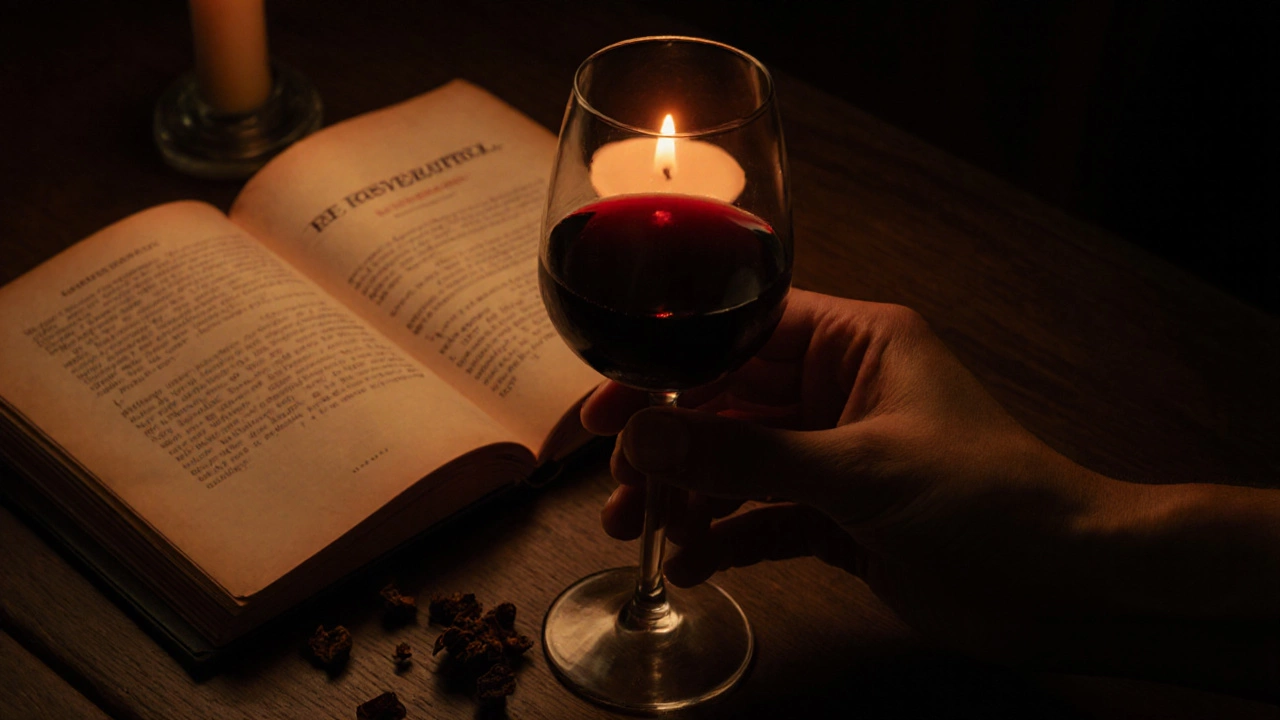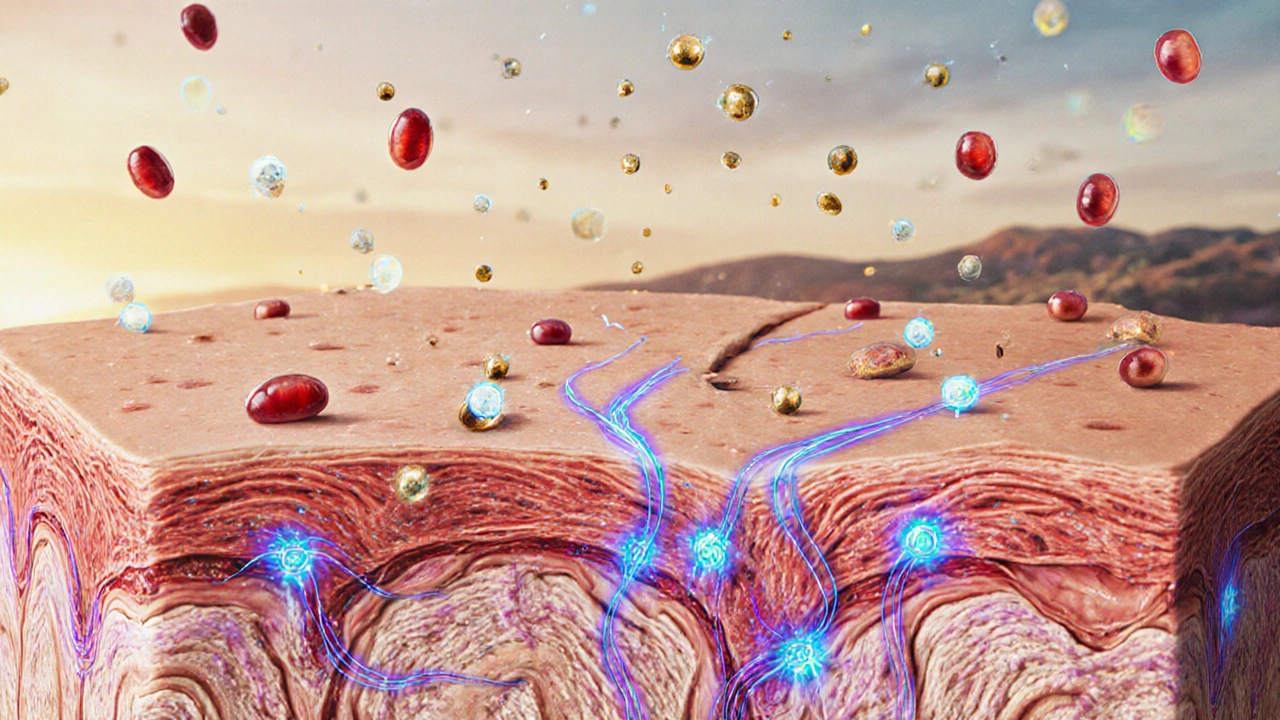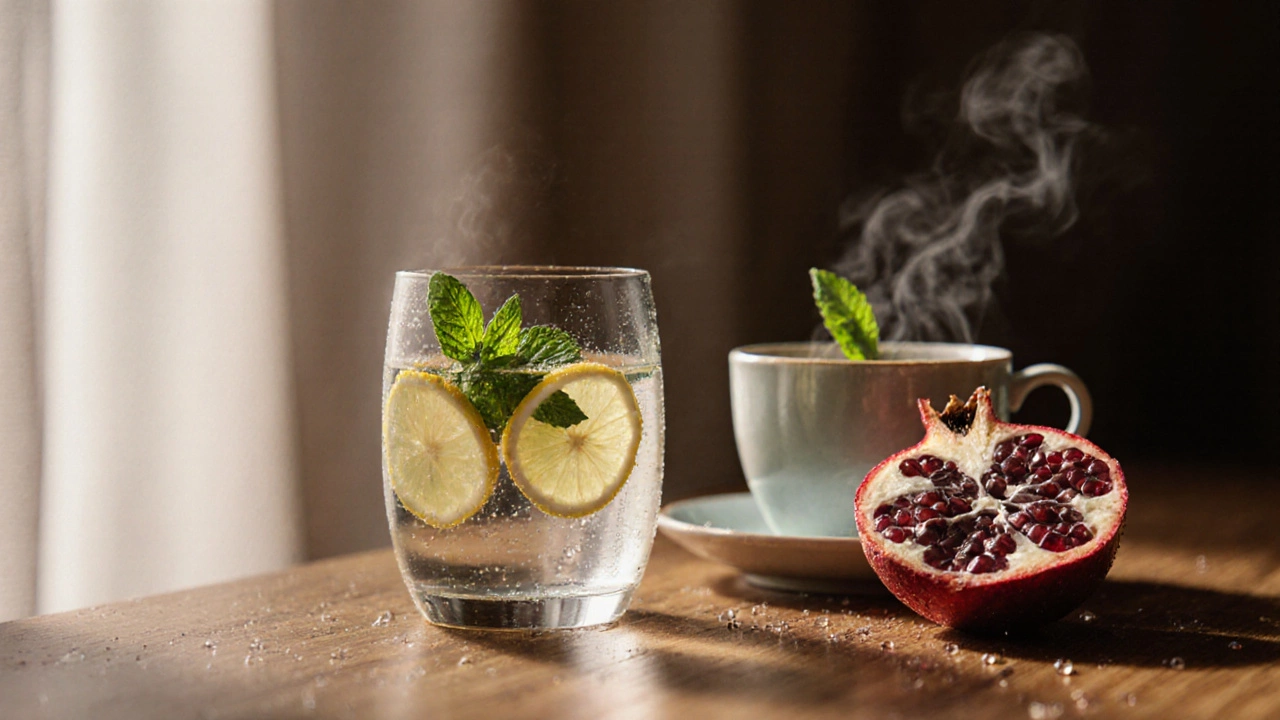Anti-Aging Beverage Impact Calculator
Your Drink Habits
Results
Overall Anti-Aging Impact
Personalized Recommendation
How It Works
Based on scientific studies: each drink contributes to anti-aging potential. Green tea and pomegranate juice have strong antioxidant effects, water improves hydration, red wine (in moderation) contains resveratrol, and harmful drinks accelerate aging through glycation and inflammation.
Everyone wants to look younger, but most people focus on creams, serums, and laser treatments. What if the secret to slowing down aging isn’t in your bathroom cabinet-but in your glass?
It’s not just about what you put on your skin
Anti-aging isn’t just a skincare routine. It’s a whole-body process. And what you drink plays a bigger role than most realize. Skin aging happens because of oxidative stress, inflammation, and declining collagen. These aren’t random. They’re driven by what you eat and drink every day. The right beverage can reduce free radicals, boost cellular repair, and even turn on longevity genes. The wrong one? It accelerates damage.
Let’s be clear: no drink will erase wrinkles overnight. But science shows some beverages can slow down the clock-significantly. And the evidence isn’t from marketing hype. It’s from peer-reviewed studies on human cells, animal models, and long-term population data.
Green tea: the most studied anti-aging drink
Green tea isn’t just a calming ritual. It’s a powerful biological tool. The key compound? Epigallocatechin gallate, or EGCG. This antioxidant is 100 times more potent than vitamin C at neutralizing free radicals. A 2020 study in the Journal of Clinical Biochemistry and Nutrition found that people who drank three cups of green tea daily had 30% less skin wrinkling over five years compared to non-drinkers.
EGCG doesn’t just fight damage-it helps rebuild. It boosts collagen production by inhibiting the enzyme that breaks it down. It also reduces inflammation linked to sagging skin. And unlike topical applications, drinking it delivers these benefits deep into the dermis. Cold-brewed green tea has even higher EGCG levels than hot-brewed, because heat can degrade some of the compounds.
Best way to drink it? Unsweetened. Add lemon to increase EGCG absorption by up to five times. Skip the sugar-it spikes insulin, which accelerates glycation, a process that stiffens collagen and makes skin look dull.
Pomegranate juice: nature’s skin shield
Pomegranate juice is another standout. It’s packed with punicalagins-antioxidants so strong they’re found in very few other foods. A 2019 clinical trial published in Phytotherapy Research showed participants who drank 8 ounces of pomegranate juice daily for 12 weeks had 27% less UV-induced skin damage. Their skin elasticity improved, and surface roughness dropped.
What makes pomegranate special is its ability to protect the skin’s natural barrier. UV radiation doesn’t just burn skin-it breaks down the lipid layer that holds moisture in. Pomegranate juice helps rebuild that barrier. It also stimulates fibroblasts, the cells that make collagen and elastin. And unlike synthetic antioxidants, it works synergistically with your body’s own defense systems.
Choose 100% pure juice with no added sugars. A small glass a day is enough. Too much can raise blood sugar, which defeats the purpose.

Red wine (in moderation): resveratrol’s quiet power
Resveratrol, the compound in red grape skins, has been called the “longevity molecule.” It activates SIRT1, a gene that helps cells repair DNA and resist stress. Studies in mice show resveratrol extends lifespan by up to 30%. Human trials are less dramatic, but still promising.
A 2022 study in the British Journal of Dermatology found that participants who consumed 100ml of high-resveratrol red wine (about 3.5 oz) five times a week for six months had significantly improved skin texture and reduced fine lines. The effect was strongest in those over 50.
But here’s the catch: you need the right wine. Most commercial red wines have barely enough resveratrol to matter. Look for wines made from Pinot Noir grapes grown in cooler climates like Burgundy or Oregon-they have higher concentrations. And drink it with food. Alcohol on an empty stomach increases inflammation, which cancels out the benefits.
One glass, max. More than that, and the alcohol itself becomes a major aging trigger.
Water: the forgotten anti-aging hero
It sounds basic, but dehydration is one of the biggest invisible accelerators of aging. When your body lacks water, your skin loses plumpness. Fine lines become deeper. Toxins build up. Your kidneys and liver can’t flush out waste efficiently.
A 2021 study in the International Journal of Cosmetic Science tracked 50 women who increased their daily water intake from 1.2L to 2.5L. After 8 weeks, their skin hydration improved by 42%, and skin elasticity rose by 28%. The effect was visible even in women who didn’t change their skincare routine.
Drink water consistently throughout the day-not just when you’re thirsty. Thirst is a late signal. Aim for 2-3 liters depending on your activity level and climate. Add cucumber slices, mint, or lemon if you find plain water boring. But avoid sparkling water with added citric acid-it can erode tooth enamel over time, and that’s not worth it.

What to avoid: the real aging culprits
Not all drinks are equal. Some actively speed up aging.
- Sugary sodas: One 12-oz can contains 39g of sugar. That’s enough to trigger glycation, which turns collagen into brittle, yellowed fibers. Studies link daily soda consumption to 10-20% faster skin aging.
- Energy drinks: High caffeine and sugar spike cortisol. Chronic stress raises inflammation and breaks down collagen. Many also contain artificial sweeteners like aspartame, which may disrupt gut health-and your skin reflects that.
- Excess alcohol: Beyond red wine, any alcohol dehydrates skin, dilates blood vessels, and impairs liver detox. Long-term drinkers often have dull, uneven skin tone and visible capillaries.
- Flavored coffee drinks: A grande caramel macchiato can have 40g of sugar and 300 calories. That’s a sugar bomb disguised as a treat.
It’s not about perfection. But if you’re serious about aging gracefully, cutting these out-or drastically reducing them-makes a measurable difference.
What’s the best combo?
You don’t need to drink all of these every day. The most effective routine is simple:
- Start your day with 500ml of water with lemon.
- Have one cup of unsweetened green tea mid-morning.
- At lunch, sip 100ml of pure pomegranate juice.
- For dinner, enjoy a small glass (100ml) of high-resveratrol red wine, if you choose to drink.
- Finish the day with another glass of water.
This routine adds up to less than 150 calories a day from drinks-not counting water. And it delivers a powerful mix of antioxidants, anti-inflammatories, and cellular protectors.
It’s not magic. It’s biology.
Anti-aging isn’t about finding a miracle potion. It’s about consistent, smart choices. Your skin is a mirror of your internal health. What you drink affects your blood sugar, your inflammation levels, your detox pathways, and your cellular repair systems.
Green tea, pomegranate juice, red wine (in moderation), and water aren’t just drinks. They’re tools. Used right, they help your body do what it was designed to do: heal, protect, and renew.
Forget expensive creams. Start with your glass. The results won’t be instant-but they’ll be real, lasting, and built from the inside out.
Can drinking water really reduce wrinkles?
Yes, but not by itself. Water improves skin hydration and elasticity, which makes fine lines less noticeable. A 2021 study showed a 28% increase in skin elasticity after participants increased daily water intake to 2.5 liters. But water won’t reverse deep wrinkles caused by sun damage or genetics. It works best alongside antioxidants from green tea or pomegranate juice.
Is green tea better than coffee for anti-aging?
For anti-aging, green tea has the edge. Coffee contains caffeine, which can dehydrate skin and raise cortisol if consumed in excess. Green tea has EGCG, a powerful antioxidant that reduces inflammation and boosts collagen. Both have benefits, but green tea’s compound profile is more directly linked to skin repair. If you drink coffee, stick to black, unsweetened, and limit to one cup a day.
Does pomegranate juice lighten dark spots?
Not directly, but it helps. Pomegranate juice doesn’t bleach skin. Instead, it reduces UV-induced pigmentation by blocking the enzymes that trigger melanin overproduction. Over time, this can fade sunspots and even out skin tone. It’s a slow, natural approach-not a replacement for topical treatments like vitamin C or retinoids, but a strong supporting player.
Can I get the same benefits from supplements?
Not really. Studies show whole foods and drinks deliver better results than isolated supplements. EGCG from green tea works with other polyphenols in the tea leaf. Resveratrol in wine comes with flavonoids that enhance its absorption. Supplements often lack these synergistic compounds. Plus, you miss out on hydration and the ritual of mindful drinking. Food-first is always the stronger strategy.
How long until I see results from anti-aging drinks?
Most people notice improved skin hydration and glow within 2-4 weeks. Visible reduction in fine lines and improved elasticity usually takes 8-12 weeks. This isn’t a quick fix-it’s a long-term investment. Consistency matters more than quantity. Stick with it for three months, then reassess.

